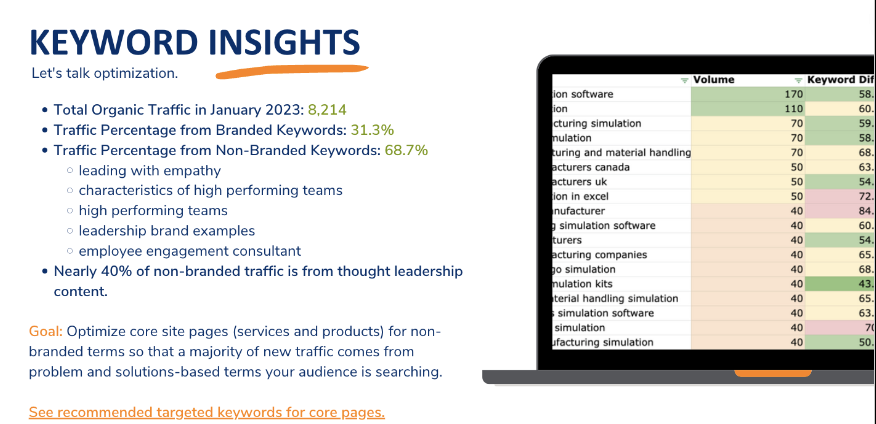Your digital channels – we’re talking about everything from your company’s website to its social media pages – play a key role in attracting new customers, finding qualified leads, and communicating the unique value of your business offerings.
That’s why routinely looking at what’s working (and what’s not) across your digital marketing efforts is a paramount practice for brand success. But where does your team start?
Enter: the digital marketing audit.
Here we'll cover the ins and outs of digital marketing, first starting with what an audit is and why it’s important.
What is a digital marketing audit?
A digital marketing audit serves as a report card for your company’s digital campaigns by looking at all of your online marketing activities and identifying opportunities for improvement and optimization.
Based on your company’s unique needs, the audit could look at everything from website analytics, e-commerce platforms, search engine optimization (SEO) efforts, search engine marketing (SEM) activities, social media engagement, paid display and search advertising, and email marketing. The holistic view of your online marketing will determine how successful your efforts are in driving people to your website, and then holding their attention once they’re there.
Why is it important to look at all of this? Well, by conducting a digital marketing audit, you’ll be able to fine-tune your efforts, enabling you to:
- Make impactful campaign adjustments that reach the right people
- Evaluate if you’ve chosen the right keywords for your content
- Address any campaign errors that arise
- Discover what content is resonating with your desired audience(s) so you can replicate success or shift gears
- Learn how you’re stacking up against competitors
- Validate investment decisions using hard data
Who needs a digital marketing audit?
We are inclined to say that every company with a website should be conducting semi-regular digital marketing audits. If we want to get into the nitty gritty…investing in a digital marketing audit could be particularly useful for:
1. High-growth companies looking for new customers
Did you know that up to 84% of all people (yes, that includes your potential customers) are looking to solve problems by searching online for resources? That means that your website can serve as a valuable tool for your target audience(s).
You want more customers – that’s a given. A digital marketing audit will do the leg work by identifying ways to attract new customers to your website, provide useful information to them, and in turn, encourage them to learn more about what you do.
2. Companies that have an active website presence but aren't investing in marketing activities
As you consider the role your website plays in providing valuable information to your potential customers, it’s equally important to think about how it could negatively impact your online presence. Companies with older websites that have been built and iterated on over time may find this audit particularly useful to look at what’s going on beneath the hood and discover the impact that the website is having from both a positive and negative perspective.
For example, are you overdue for a website overhaul and redesign? Or can your website issues be addressed through SEO optimization? Or maybe you have multiple pages that are optimized for the same keyword, and you're cannibalizing your own SEO efforts without even knowing it.
That can be fixed, but first the issue needs to be identified. A digital marketing audit will look at your online marketing activities holistically to identify these types of insights, providing you with data to know where to start investing your time and energy.
3. Companies facing change
Sometimes companies have a specific event happen that triggers the need for a digital marketing audit, including:
- Planning for a new year or quarter
- Change management activities
- KPI adjustments during strategic planning initiatives
- Strategic direction change
- New partners brought on board requiring these insights
Ultimately, it's critical for nearly every company to do a digital marketing audit to ensure they're putting out effective content. Full stop.
How long does a digital marketing audit take?
As you consider what you’re getting out of investing in a digital marketing audit, it’s important to understand the process from start to finish. Most agencies will require at least a two-week turnaround after you hand over all of your digital assets (passwords, logins, etc.) to give enough time for a comprehensive audit – but it could be longer depending on how many webpages you have, how much you’re posting on social, what paid search campaigns you have active, so on and so forth.
Regardless, be prepared for a bit of a time investment to ensure your partner agency is crossing their T’s and dotting their I’s.
Your digital marketing audit checklist
Ready to find a partner that can help your company level up your digital marketing efforts? First, we recommend you familiarize yourself with what a good approach looks like. Here's our take on what that process should include:
1. Hold a discovery meeting
The initial discovery call is arguably the most critical part of a digital marketing audit collaboration with you. We recommend sitting down – okay, it’s typically over Zoom, but you get the idea – to better understand what you’re trying to accomplish with this audit and what data you need to uncover for this to be a success.
From there, you'll want to discuss all the digital platforms that need to be evaluated, along with your audience personas. From there, an agency should be ready to start outlining your company’s objectives for the audit. Ultimately, aligning on these objectives will allow the two teams to work together seamlessly toward achieving the same goals.
2. Dive into the data on the backend of your website
Above all else, the key player in a digital marketing audit will always be your website. Why? Because your website can be a powerful online sales tool. Plain and simple. Marketing tools like SEMRush can help reveal your website’s foundational SEO performance, sitemap use, relevancy, discoverability, links, errors, and more.
In tandem, content strategy teams should conduct a deep dive of keyword research to understand what branded and unbranded terms you’re currently ranking for, and where there’s room to grow in that space.
By doing all of this, you’ll gain a comprehensive view of:
- Page crawlability (the Google bots are always watching!)
- Ease of sitemap navigation
- User experience
- Page speed
- Links
- Traffic drivers and sources
- Website behavior (e.g., which pages they’re visiting)
- Conversion paths
For example, when looking at a website’s homepage, where the goal is to quickly let someone know where they are, reassure them they're in the right place, and get them to visit interior webpages, then it’s important to look at if it’s ranking for a branded keyword (e.g., your company name) and an unbranded keyword (e.g., the business line it represents).
When looking at this, it’s also important to evaluate what the website information is focused on (e.g., is it speaking to the bottom line benefits your company provides? Or is the content solely focused on just your company itself?). Both of these factors will identify how Google looks at the page (e.g., is it helpful? Or is it self-serving?).
A good homepage evaluation will answer the following questions, pairing it with recommendations based on the findings:
- Headline – Is your headline optimized for a relevant keyword? Does it explain what you do?
- Description Paragraph – Does the key description summarize your company’s value proposition, noting what the business category is and why you’re different from competitors?
- Initial Call-To-Action (CTA) – Do you have a CTA button up top that people can easily click to find out more about you?
- Visual Element – Is your hero photo or video complementary to your written content on the page? Does it make sense for your business and audience’s needs?
- Social Proof – If you feature logos from clients you work with, are they prominently featured for validation of your business success?
- Conversion Copy – Does your body copy provide information that addresses your audience’s key triggers, motivations, objections, alternatives, and priorities?
- Final CTA – Have you ended the page with a clearly defined next step for them to take?
Honing in on this data will open the floodgates for identifying opportunities to improve website traffic, functionality, discoverability, SEO, and more.
3. Understand how you stack up against the competition
It’s always, always important to look at how a website is performing compared to a company’s top competitors. This analysis will identify valuable insights to inform best practices from other organizations to emulate and improve upon for your own site.
For example, in PMG's analysis below, you’ll see a competitor analysis that looks at everything from authority of the website on Google to traffic, backlinks, and keyword performance. This data shows that the website we’re evaluating ("Your Company") is falling behind Competitor 1 which has 66% of traffic and 85% of the organic terms ranking for being non-branded.


By simply looking at a few competitors, we’ll identify a few key areas of opportunity.
4. Evaluate your other digital marketing activities
While your website’s success is a key factor in a digital marketing audit, it’s not everything. Taking a holistic look at all of your online marketing efforts will allow you to finetune activities and have them work in parallel to boost brand awareness, drive website traffic, and reach new audiences.
When conducting a digital marketing audit, other key areas of focus should include:
Content marketing
Your content marketing strategy includes all of the content you’re developing to reach your target audiences (e.g., blogs, podcasts, infographics, case studies, whitepapers, etc.). When evaluating your content marketing efforts, using metrics to inform decisions is key. For example, when looking at your blog content needs, consider which blogs have been your highest performers and which ones haven’t quite hit the mark.
Curious about which metrics you should be looking at? We recommend:
- Visitors (how many people are visiting your site?)
- Visit duration (how long are they staying?)
- Engagement (are they clicking on anything within your content?)
- Referral sources (where are they coming from?)
By evaluating these data points, you’ll have a clearer picture of which content you should continue to develop, what content should be optimized to perform better, and which content you should remove from your strategy moving forward. Build this all out in a thoughtful content calendar as an actionable step for you to move your digital marketing audit findings forward.
Social media
Yes, content marketing includes social media posts, but social media also stands on its own in a lot of ways. As you evaluate your social media content strategy and performance, look at your profiles holistically, asking yourself a few key questions:
- Does my profile accurately reflect my brand?
- What do my follower growth and engagement metrics look like?
- What are my top-performing posts?
- What are my competitors doing on social media?
- Is my audience more active on specific platforms over others?
All of this data will also inform your next steps. For example, if your LinkedIn is far outperforming your Instagram profile, perhaps you’ll focus more of your efforts on growing your LinkedIn profile presence moving forward. No matter what you decide to do from there, the data allows you to build a case that supports your actions.
Paid advertising
From Google and Bing ads to paid social, if you’re spending budget on ads, you want them to be performing well. This part of your digital marketing audit will evaluate your paid campaign budget in relation to your progress to goals, by looking at:
- Impressions
- Cost per click
- Click through rates
- Actions taken
- Conversion rate
- Cost per action
By measuring these key performance indicators, you’ll see where your ads are performing well and where they’re falling short, allowing you to shift budget accordingly for optimization or pull the plug entirely on an ad. If your results indicate that you should try optimizing an ad, you can adjust the header, call to action, visual, etc. in order to make it more appealing to the audience you’re trying to reach.
Online reputation management
93% of customers have made a purchasing decision based on an online review. Thus, if your business is dependent on customer reviews, auditing your online reputation is important for your business goals.
Looking at Yelp and Google Reviews can give you a better understanding of what’s being said about your brand online and will help you learn about customer pain points, what you should keep doing, and what offerings you should create or improve to better serve your customers in the future. While it’s not always advised to remove negative reviews, if you come across some in your audit, consider replying to them, acknowledging the concern and providing solutions.
Email marketing
Last, but certainly not least, your digital marketing audit will be capped off by looking at your email marketing campaigns. Reviewing the performance of everything from email design to campaign engagement will allow you to…you guessed it, optimize your efforts moving forward. We’re sure you’ve got the theme now. A few things you’ll want to look closely at:
- Unsubscribe rate
- Performance compared to industry benchmarks
- List health and growth
- Conversions
- Clicks
- Engagement with various types of content
- Content optimization for mobile
- Call to action clarity
This data will empower you to clean lists up (e.g., removing inactive users), learn which content resonates best with your subscribers, deliver clearer actionable content, and more.
Read: Email Marketing Strategy 101: Your Guide to Mastering the Customer Inbox
After you get a holistic view of everything above, that leads us to…
5. See the big picture (in an easy-to-understand presentation)
Importantly, you should expect your agency partner to deliver all audit findings in an easy-to-digest way, including a visual presentation (see PMG's example below) with voiceover talking points, and a follow-up document that shares all findings.
A strong partner will not only provide these materials, but discuss them with you, answering questions along the way to ensure you understand the audit activities and rationale behind each recommendation. After all, this is a partnership, not a dictation. Your questions matter and will ultimately impact the success of your audit.

6. Identify quick wins and long-term opportunities
A digital marketing audit may reveal what feels like an overwhelming number of recommendations. Chances are, you'll want to rely on the experts for suggestions on how to prioritize.
At PMG, as we start to evaluate recommendations that make sense to implement, we typically take a two-pronged approach:
- Quick wins to show immediate impact
- Longer-term updates that will improve performance over time
Quick wins may include things like fixing broken links, updating existing CTA buttons, making visual swaps, updating landing pages, and more. Longer-term updates will include activities such as page rewrites, page optimizations updated site architecture, and new campaign strategies. By laying all of this out, we can align on a game plan and start to implement it.
Are you ready to audit your digital marketing?
A digital marketing audit can reveal dozens of action items and recommendations to optimize your online efforts and attract potential customers. As you consider outsourcing this project, be sure to work with a partner that has a buttoned-up approach; one who collaborates with you, clearly outlines your audit results, prioritizes and balances your needs within your marketing budget, works through all of your digital priorities, and repairs and rebuilds your digital marketing efforts with a smart and strategic lens.
(HINT: We happen to know some experts who are up for the job!)
If you’re ready to dive in on your digital marketing audit, just book a meeting today and we can get started!
More resources for digital marketing:












